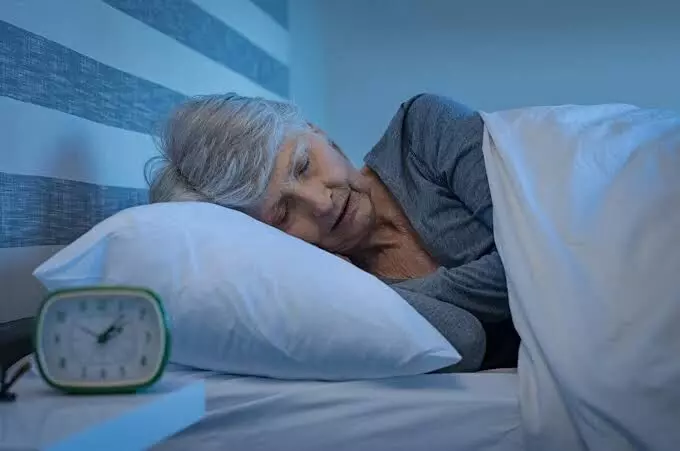Attn senior citizens: Here are some tips for quality sleep
Quality sleep is essential for overall health and well-being, particularly in older adults. Adequate rest contributes to cognitive sharpness, mood stability, and productivity during the day
By Anoushka Caroline Williams
Representational Image
Hyderabad: A newly published research study has shed light on a critical aspect of a good night's sleep for older adults.
According to this research, the ideal bedroom temperature for older adults, aged 65 years or above, should be between 20 and 25 degrees Celsius. The study, conducted by the Marcus Institute for Aging Research and Harvard Medical School in Boston, US, underlines the significance of this finding for sleep quality and the potential impact of climate change on the sleep patterns of older individuals.
The Importance of Restful Sleep:
Quality sleep is essential for overall health and well-being, particularly in older adults. Adequate rest contributes to cognitive sharpness, mood stability, and productivity during the day. Conversely, poor sleep quality over the long term has been linked to cognitive decline, dementia, and a heightened risk of developing conditions such as diabetes and cardiovascular diseases.
Dr.Bhanu Priya Kandagatla], a sleep specialist said: "This study underscores the critical importance of maintaining an optimal sleep environment for older adults. Temperature plays a crucial role in sleep quality, and it's vital for individuals to be aware of this factor."
"As cities become warmer due to climate change and urban-induced warming, it's imperative that we consider the impact on sleep quality, especially for older adults. Personalized temperature adjustments based on individual needs can make a significant difference," said Sleep Specialist, Dr. Srikar Darisetty from Apollo Healthy City, Film Nagar.
"Environmental interventions are often overlooked in improving sleep quality among older adults. This research reinforces the notion that small changes in the sleep environment can have a substantial impact on overall health," he added.
Understanding the Role of Temperature:
The research findings highlight the strong correlation between ambient night-time temperature and sleep efficiency in older adults. It was observed that as the bedroom temperature rose to 30 degrees Celsius, sleep efficiency dropped by 5-10 percent. This reduction in sleep quality can lead to irritability, lower productivity during the day, and, potentially, long-term health issues.
Key Implications for the Future:
The study's findings hold significant implications, particularly in the context of climate change and urban warming. As cities become hotter, adapting to rising temperatures becomes paramount. Here are some key takeaways:
Personalized Adjustments: Individuals, especially older adults, should consider adjusting their sleep environments to maintain an optimal temperature between 20 and 25 degrees Celsius.
Climate Adaptation: Climate change and urban warming can have adverse effects on sleep quality. Cities need to be proactive in addressing these challenges to safeguard the well-being of their aging populations.
Health Awareness: It's essential for healthcare providers and individuals to recognize the role of sleep environment in overall health. Environmental interventions should be included in strategies to improve sleep quality.
Further Research: The study calls for additional research to identify specific sleep-related outcomes that most impact older adults' short- and long-term health. Understanding these links can refine interventions and healthcare approaches.
The importance of a restful night's sleep cannot be overstated, especially for older adults. The recent study emphasizing the significance of maintaining an ambient night-time temperature between 20 and 25 degrees Celsius offers valuable insights for both individuals and healthcare providers. As we navigate a changing climate, optimizing sleep environments becomes a crucial aspect of maintaining the health and well-being of our older population.